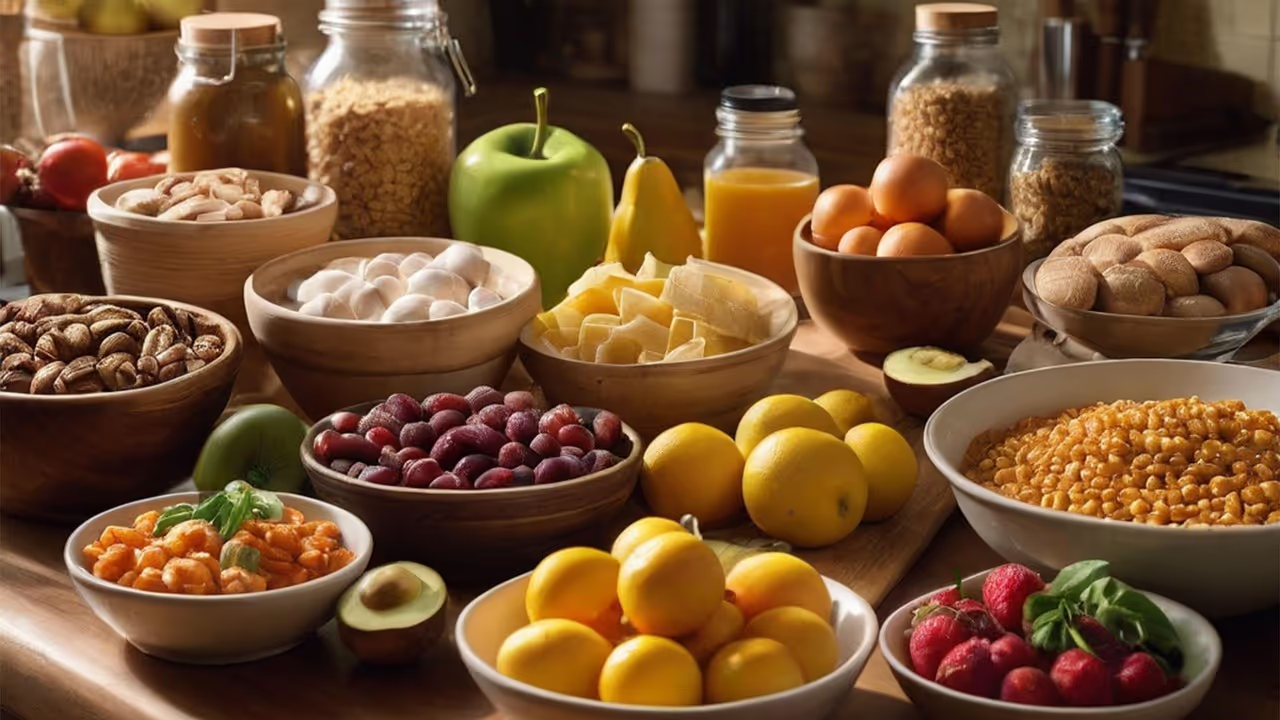Powerfully through life - plant-based proteins for health and vitality
As we age, muscle mass naturally decreases. However, this process can be significantly slowed down through targeted nutrition and regular training. The right protein intake plays a central role - ideally from plant sources.
Health tips

15 October 2025

6 Min.

Why protein is so important for muscles
Proteins are among the basic building blocks of our body. They are present in every cell, control countless metabolic processes and are significantly involved in the regeneration of muscles, bones, skin and organs. If the body lacks protein, it loses substance. Especially from the age of 50 It is becoming increasingly challenging to maintain muscle strength. Metabolism slows down, hormone production changes and the so-called anabolic resistance means that the muscles react less efficiently to protein. Without targeted countermeasures, the body begins to break down muscle tissue - a process that can impair mobility and quality of life in the long term.
More protein after 50 - quality counts
Nutritionists recommend gradually increasing the daily protein intake from 0.8 g to 1.0 to 1.2 g per kilogram body weight to increase. This amount helps maintain muscle mass and at the same time promotes regeneration after physical exertion. However, it is not only the quantity but also the quality of the protein sources that is decisive. Vegetable proteins are particularly beneficial because, when combined correctly, they ensure an excellent supply of all essential amino acids and offer health benefits. At the same time, they provide fiber, phytochemicals and vitamins, but are free from cholesterol and excessively saturated fatty acids.
Plant-based power - sources of protein from nature
Legumes such as lentils, beans, peas or chickpeas are true protein packs. In combination with cereals, for example in a lentil curry with rice or a chickpea salad with whole grain bread, there is a particularly high-quality protein balance — the so-called “complementary protein intake.” Auch nuts, almonds, walnuts and seeds provide valuable protein and healthy fats that protect the cardiovascular system. Chia and flaxseeds also have the advantage of containing omega-3 fatty acids, while quinoa and amaranth provide all essential amino acids — similar to animal proteins. Even many types of vegetables, such as broccoli, spinach or kale, as well as soy products such as tofu, contribute significantly to protein intake when consumed regularly and complement a balanced diet.
Power and endurance — the ideal combination
Increased protein intake is particularly effective when combined with exercise. Muscles need stimulation to grow and protein to regenerate. Studies show that, especially in middle and older age, the combination of strength-oriented training and adequate protein intake is the most effective strategy against sarcopenia, i.e. age-related muscle atrophy. It is considered ideal to divide training into two thirds of endurance training (e.g. walking, swimming, cycling) and one third targeted strength training. This mixture not only supports muscle growth, but also the cardiovascular system, metabolism and mental performance.

When and how proteins work best
In order to promote muscle growth, it is useful to distribute your protein intake throughout the day. Ideal are 20-30 g protein per main meal, for example in the form of granola with soy yogurt and nuts for breakfast, lentil soup for lunch and a dish with tofu or fish for dinner. A small protein snack after training also supports regeneration. In addition, research shows that a protein meal in the evening can stimulate muscle protein synthesis at night — the body actively uses the rest phase to repair. It is important to take in enough liquid, as the kidneys work harder when there is an increase in protein intake.
Eat consciously, train specifically
Anyone who regularly integrates plant-based protein sources into their diet and challenges their body through exercise is laying the foundation for a strong, active life — regardless of age. In addition to muscle strength, the immune system, bone health and mental fitness also benefit. A protein-rich, plant-based diet helps to increase energy, stable joints and mobility well into old age.
Fitness and vitality at Menschels Vitalresort
The Menschels Vitalresort has everything guests need to enjoy an active and healthy lifestyle. There is a modern fitness room available for targeted strength and endurance training. With the help of a professional trainer, you can develop a personalised training or vitality programme based on your preferences and physical needs.
The Organic Vitality Cuisine complements this concept wonderfully. Chef René Steinmetzger and his team prepare balanced, plant-based dishes every day. These are rich in high-quality proteins from legumes, grains, nuts and seeds. These delicious dishes combine health benefits with culinary delights, demonstrating that a healthy diet and a zest for life can go hand in hand.
Important notice
If you have or are at risk of developing kidney disease, you should be careful about how much protein you eat. This is because the waste products created when protein is digested can build up in the blood and put stress on the kidneys.
Individual fitness diagnostics for Menschels
As part of a comprehensive fitness check, we use holistic diagnostic methods to analyse your initial physical situation. On this basis, we create a vital and training program tailored to you. On request, we can also offer you personal coaching that motivates and safely accompanies you.
You can find out which health modules and check-ups we offer at ”doctor's practice“.
















